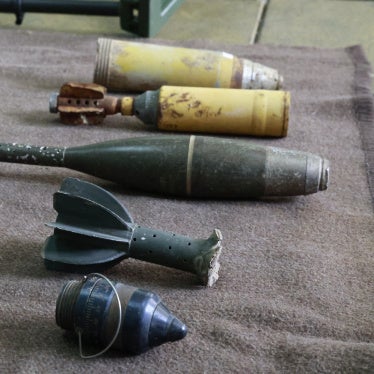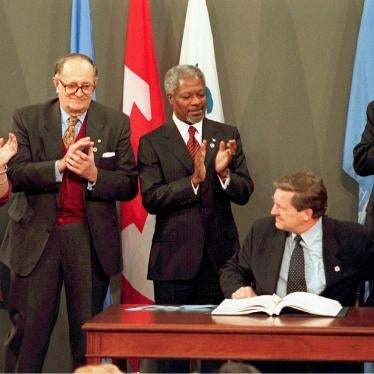Thank you Mr. President,
A total of 155 States Parties do not have stockpiles, including 89 States Parties that have officially declared completion of stockpile destruction, 64 that have declared never possessing antipersonnel mine stocks, and two that have not made an official declaration but are not thought to possess stocks. These are Equatorial Guinea and Tuvalu. South Sudan, which recently succeeded to the Convention, stated earlier this week that it does not have stockpiles.
We welcome Turkey’s announcement that the destruction of its ADAM mines was completed on 21 June 2011. We had been awaiting this announcement with great anticipation and we are happy to celebrate with Turkey the completion of its obligations under Article 4. We are also pleased to note that it seems that taking steps to confirm the actual physical destruction of stocks is accepted practice when measures to ensure the destruction of stocks are taken on territory outside the jurisdiction or control of the State Party.
The other most recent state to complete destruction was Iraq, which had a stockpile destruction deadline of 1 February 2012. It reported in June 2011 that it destroyed 645 out of 690 antipersonnel mines that had been stockpiled in the Kurdistan region, retaining 45 mines for training purposes.
Collectively, States Parties have destroyed more than 45 million stockpiled antipersonnel mines.
We deeply regret that we are still discussing the violation of the treaty’s obligation to destroy stockpiles by three States Parties. Belarus and Greece missed their stockpile destruction deadlines more than three years ago, and in Ukraine’s case, over one year ago.
While we have been pleased to note positive developments in each country at every meeting since March 2009, we are also still convinced that these states and their international partners can act with a greater sense of urgency, an urgency that should be expected after failing to meet a critical treaty deadline.
We are certain that with greater efforts, at least Greece could have finished stockpile destruction by now. Belarus and Ukraine, despite the complexity of their destruction requirements, could have been far closer to completion. We encourage each state to do everything in its capacity to speed up the processes that will lead toward final stockpile destruction.
We laud the level of transparency shown by the Guinea Bissau and the Former Yougoslav Republic of Macedonia in promptly reporting the discovery of stocks of antipersonnel mines. We hope these will be destroyed as soon as possible.
We continue to be concerned about the situation in Greece. On the one hand, we were pleased to learn that the 480 mines that were missing from a shipment to Bulgaria were found in a Greek warehouse, and that this prompted Greece to conduct a review of all the stocks, leaving slightly under one million mines remaining to be destroyed. We appreciate Greece's transparency on both of these points. It is a lesson for other States Parties to be vigilant and recognize that additional stockpiled mines could still exist undetected in their own military stores.
We were disturbed to learn that the company EAS has renewed legal action through an appeal and that destruction will not go forward until the judicial proceedings are concluded, with no timetable available. And while Greece’s financial situation is obviously dire, it should do its utmost to become compliant with its treaty obligations. When a contract is signed, we urge Greece, based on previous calculations of capacity, to agree to a timeframe for destruction of less than one year.
With respect to Belarus, we were encouraged back in June to hear that a contract was signed with funds from the European Commission, and to hear today that the physical destruction of mines is about to start. As we heard, the contract was granted in December 2010, and destruction is expected to be completed in 2013. Further information is required, specifically, when in 2013 is it expected to be complete -- at the beginning of 2013 or at the end? We appreciate Belarus’s transparency regarding its stockpile inventory, which it revised downward in June 2011, leaving slightly more than 3.3 million PFMs still to be destroyed.
Finally, the situation in Ukraine also seems to be taking much longer than expected. Ukraine now has the capacity with its existing incinerator to destroy one million mines a year, but so far only few PFM mines have been destroyed using this capacity.
We note that the Implementing Agreement between Ukraine and NAMSA was signed this year and now awaits ratification by the Ukrainian Parliament. When the Implementing Agreement enters into force, 3 million PFM type mines will be destroyed. We greatly appreciate Norway's partnership with Ukraine in upgrading the equipment at the Pavlograd Chemical Plant so it can now safely destroy PFM type mines in an ecologically sound manner.
However, Ukraine has 5.9 million antipersonnel mines of three types in stock, as reported in its transparency report submitted in April 2011. There are 5.7 million PFM type scatterable antipersonnel mines, 149,096 POM-2 remotely delivered bounding fragmentation mines, and 4,105 OZM-4 hand-emplaced bounding fragmentation mines. NAMSA has not received a requirement from the Ukrainian side to destroy the non-PFM types and Ukraine has not articulated any requirements for international assistance to destroy these mines.
Additionally, it would be helpful to understand what plans Ukraine has to fund, or seek international assistance for, the destruction of the remaining PFM and the destruction of non-PFM stocks.
We would appreciate an update from Ukraine concerning its projected end date of stockpile destruction. In June 2011, Ukraine informed States Parties that it would be able to destroy its stockpile by the end of 2014, if it secures the necessary funding.
We would like to emphasize once again that it is clear none of these states are in willful violation of Article 4, and we take note of all the efforts they are making to carry forward their stockpile destruction. We would just like to stress the need to place a high national priority on finishing such destruction in the shortest possible timeframe so we can put this long period of non-compliance behind us.
Thank you.








